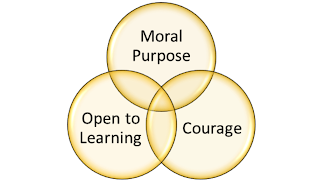For the first time in twenty years I didn't spend the summer break with some concerns about the upcoming school year nagging away at me like a rock under my towel on the beach.
Every prior summer would have me worried about things like staffing, resourcing, property and also my own sense of my own capability and capacity. Retirement from principalship has brought some advantages (though I still miss the impending excitement for a fresh year with students and staff!).
I still got riled up about the seasonal issues that rise to the surface such as the cost of school uniform (who needs it?), the growing anxiety that some students would be experiencing as they grappled with the institutional demands of their school (uniform, jewelry, hair styles, fear of not fitting in, lack of connection) - obviously not all students, but apparently an increasing number.
Last week I came across this post on LinkedIn:
I got the dreaded question very early in my course this year - “When do we start NCEA?” Oh dear. How did we get to this point?
We have our young people so focused on outcomes we are in danger of losing the importance of learning for the sake of it. This has been recognised in the NCEA review of course. However, I am unsure whether that will change anything without teachers thinking a little differently.
To be clear, I was a big supporter of NCEA when it was introduced. I supported standards based assessment and influenced by David Hood’s excellent “Our Secondary Schools don’t work anymore”, was fired up for a major change to our education system for the good. There has been some. The increased flexibility and customisation of NCEA has enabled some innovation in both assessment and curriculum. The shift to internal assessment has created a far more equitable environment.
However, NCEA seems to have become the curriculum. Topics are presented as standards. Teachers when meeting their students for the first time, show the NCEA standards. I generalise of course. It isn’t all like that. And once again, this is something the NCEA review is supposed to solve. We shall see.
I can think back to teaching Bursary, which for History was 40% internally assessed so it wasn’t all on the exam. The exam still dominated. However, at least none of my students rocked up asking when we start Bursary. It wasn’t like that.
NCEA is a system of assessment (and accreditation). It is there to assess student understanding. Not to drive learning. Not to become the sole focus. It isn’t that difficult to shunt into the background. It really isn’t. However, I rarely see that. It is ever present.
My question to teachers and schools is, do you feel the NCEA change will solve this?
Anyone who's ever read or listened to me about this topic know my view, a view that we brought to life at Hobsonville Point Secondary School and brought about deep learning, quality qualifications and meaningful pathways for all:
- NCEA Level 1 is a qualification with no currency
- It is not needed for any job, further training or pathway
- It is not needed prior to achieving Level 2 or Level 3
- NCEA Level 1 is damaging to learning
- It moves the focus from learning to being assessed
- It creates the credit counting amongst students we are frustrated with
- It creates the culture of asking how many credits something is worth before a student commits to any effort
- It creates stress that impacts learning and engagement because of the continual focus on high-stakes assessment
- NCEA Level 1 is damaging to teaching
- It creates a culture of 'teaching to the test'
- It creates massive teacher workload with it's incessant moderation
- NCEA Level 1 takes time away from learning and teaching
- Mock exams eating into learning time
- Marking eating into teaching time
I posted my response to the Linkedin post as follows:
It doesn't matter whether it's the old or new NCEA it's the school/ teacher mindset that needs to change. We don't introduce learning episodes to students below NCEA by showing them the assessment, we should definitely describe the learning outcomes and then get on with the learning. We need a similar approach in qualification years. Clarify and share the learning outcomes, do the learning, and then collect evidence against the Learning Objectives.
A couple of simple things I would do are:
1. Don't offer & assess L1 in Year 11. This only creates the culture of learning for credits a year too early for a qualification not 1 student needs. (see in post above). If your school is not open to this then:
2. Stop using formal reports to parents to report NCEA achievement. They can see the results in the LMS! This only reinforces that the most important outcome is the Achievement Standard when it should in fact be the learning. Report achievement against the Learning Objectives, preferably in relation to the NZC levels (as we do at every other year level).
3. Do not include a list of Achievement Standards on any course outline students get at the start of the course. Concentrate on what they will learn about and master in your course. You could include a generic statement that says students will be prepared to be successful in sufficient ASs to enable them to achieve their Qualification.
I feel very strongly about the negative impact NCEA Level 1 has on most learners (despite most of them achieving it) and on most teachers (who end up being the most reluctant to look at removing it - until they actually experience it!). I also know I spend a lot of time pushing it uphill when it comes to this issue.
Anyway, if you want to explore how your school could explore this just reach out. It's simpler than you think.









